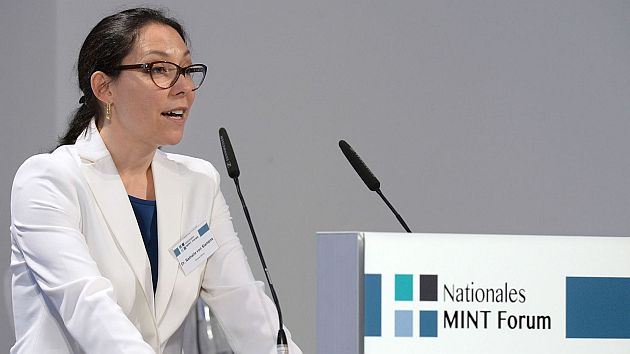How can we make vocational training for science and technology careers attractive again? How can we maintain its existing strengths? How can we avert the looming shortage of skilled labor? These were the questions discussed by business leaders, government officials and the scientific community at the “3. Nationaler MINT Gipfel” (3rd German STEM Summit) opened by Education Minister Johanna Wanka in Berlin on June 25.
Welcoming the participants, Dr. Nathalie von Siemens said: “Successful vocational education in one of the officially recognized training professions is a ladder to help young people into a career full of outstanding opportunities for individual development and progression. The mission of vocational education is not limited to teaching theory and technical skills. Education also implies learning good judgement and strengthening an independent personality and social competence.”
Highly respected for many years, the vocational training model is coming under increasing pressure, primarily as a result of the increasing digitalization of many of the occupations and the greater popularity of positions leading to a university degree. The summit participants defined a four-pillar strategy to boost vocational training: optimizing opportunities for promotion, improving dovetailing of vocational and academic training, creating new opportunities for entry into vocational STEM education, broadening the selection criteria for applicants and aligning the career and study aspects more closely with practice.
Dr. Nathalie von Siemens to be new spokesperson of German STEM Forum
Henning Kagermann passed on his role as spokesperson to Dr. Nathalie von Siemens as scheduled at the end of the 3rd German STEM Summit. She will join acting spokesperson Thomas Sattelberger to begin her work for the “Nationale MINT Forum” (German STEM Forum) on July 1, 2015.
The Forum was founded in 2012 by the merger of a number of social organizations. More than 30 large academic institutions, foundations and associations active across the regions work to improve education in science, technology, engineering, and mathematics (STEM) along the entire educational chain. They regard the STEM subjects as an essential component of comprehensive education and present their activities and the outcomes achieved to the STEM Summit each year. Dialog with business leaders, government officials and the scientific community is a major priority as part of their work.



